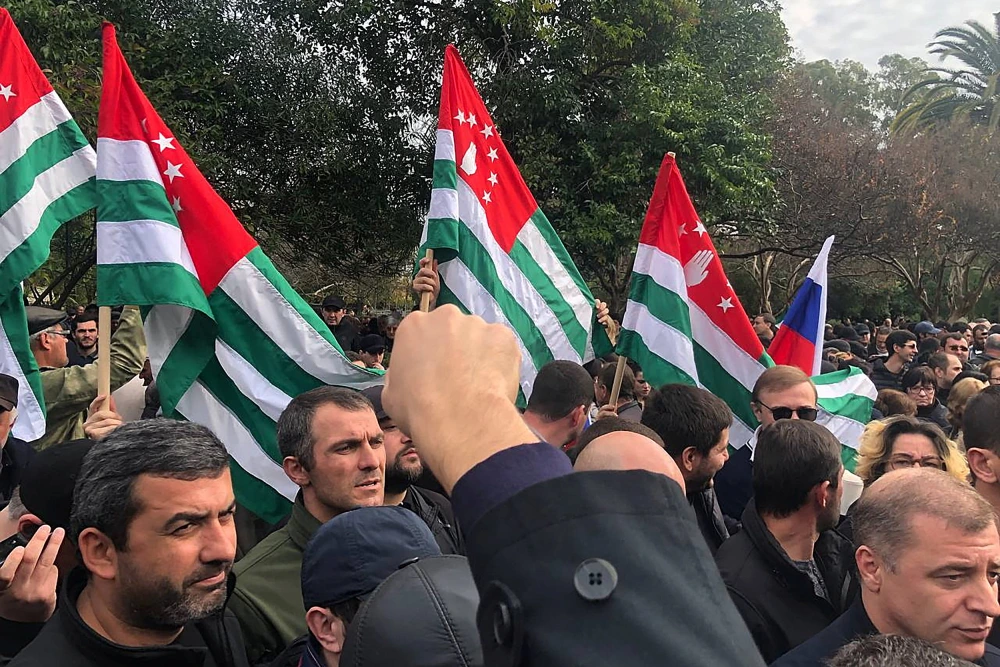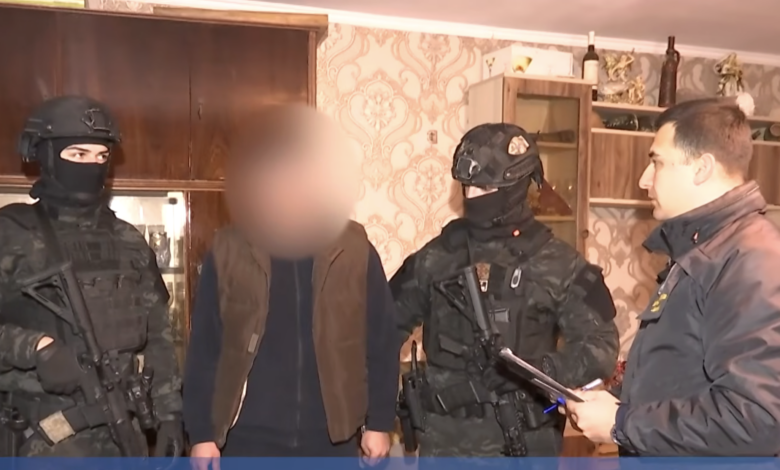
Protests Push Abkhazia’s President Out for Fourth Time
Protests Push Abkhazia’s President Out for Fourth Time
Executive Summary:
- Abkhaz President Aslan Bzhania resigned on November 19 following protests and pressure from the opposition. This follows a history of leadership changes in Abkhazia driven by mass protests and political unrest.
- The Kremlin’s financial control and strategic demands dominate Abkhazia’s politics as local unrest grows over Moscow-backed policies such as the “property agreement,” which exempts Russian investors from property taxes, further tightening Russia’s grip on the region.
- Georgia and its allies’ limited influence in Abkhazia leaves the region isolated and increasingly vulnerable to Russian pressure and influence.
On November 19, after negotiations, representatives of the so-called Abkhaz President Aslan Bzhania and Abkhaz opposition parties signed an agreement in which Bzhania resigned from office. Bzhania’s statement read, “In order to maintain stability and constitutional order in the country, I am announcing my resignation from the post of the President of the Republic of Abkhazia” (Abkhaz-auto.ru, November 19). During the negotiations for his resignation, Bzhania was in his family village of Tamish in eastern Abkhazia. He fled after thousands of residents of Sukhumi and other regions of Abkhazia occupied the parliament building, the government building, and the residence of the “head of state” in Sukhumi on November 15 and 16. The police offered them no resistance (Ekhokavkaza, November 18). Bzhania’s resignation highlights the region’s instability and geopolitical isolation, with local unrest as a flashpoint, while Moscow’s influence and strategic interests ultimately dictate its trajectory.
Opposition activists gathered in the parliamentary session hall, formed a “coordination council,” and presented the president with an ultimatum to resign, to which he agreed. The opposition decided that the vice-president, Badra Gunba, would become the acting president of the so-called republic. Prime Minister Alexander Ankvab resigned as well, while the agreement says the acting ministers will perform their duties until the newly elected president takes office. The ministers would retain their posts until the new presidential elections on February 15 or 16 next year (Apsadgil.info, November 20).
This is not the first time that Abkhazian leaders have been forced to resign. On November 26, 2004, mass protests forced then president of Abkhazia, Vladislav Ardzinba, to recognize opposition leader Sergey Bagapsh as president-elect. Earlier Ardzinba’s administration stated that his successor Raul Khajinba was elected as breakaway republic’s new president. Civil activist Tamara Shakril died during the clashes when the opposition stormed administrative buildings (Kavkaz-uzel, November 16, 2004). On June 1, 2014, Abkhaz president Alexander Ankvab resigned and found shelter on the Russian military base in Gudauta five days after the opposition broke into the presidential headquarters in Sukhumi (Civil.ge, June 1). On January 12, 2020, the next president of Abkhazia, Raul Khajinba, ran away and resigned after crowds of protesters broke into the president’s office asserting that the his election was fraudulent (Radio Free Europe/Radio Liberty, January 12, 2020).
In all cases, the change of power in Abkhazia took place with the direct participation of Moscow or in the process of the Abkhazian elites’ struggle for the status of the Kremlin’s “main partner” in the distribution of financial resources that Moscow provides to the republic. Moscow recognized Abkhazia’s independence on August 26, 2008, after its aggression against Georgia and the organization of an ethnic cleansing of the Georgian population of the Kodori Gorge in Abkhazia. This time, unrest was sparked by opposition to a “property agreement” between Abkhazia and Russia, which would allow Russian companies to invest in the region under the law “On the Avoidance of Double Taxation and Prevention of Fiscal Evasion with Respect to Taxes on Income.” This agreement would exempt registered Russian entities launching investment projects in Abkhazia from property taxes for eight years upon their registration in Abkhazia. (Kremlin.ru, November 2; OC-Media, November 22). Opponents of the agreement argue that it would inflate property prices and increase Moscow’s influence in the region (Radio Free Europe/Radio Liberty, November 15). Many Abkhazians are afraid that with this agreement and the previous agreement on constructing apartments in eastern Abkhazia, hundreds of thousands of Russians will move to Abkhazia. Additionally, Russian businessmen will buy Abkhaz enterprises belonging to the separatist state, the number of Russians in Abkhazia will exceed the number of Abkhazians (currently, there are slightly more than 90,000 Abkhazians), and Abkhazia will essentially become part of the “Sochi agglomeration”—the Russian Black Sea region that hosted the Winter Olympics in 2014 (Civil.ge, February 14).
David Avalishvili, from the independent outlet Nation.ge, said in his November 22 interview with this author that a change of power in Abkhazia, even if one of the leaders of the Opposition—Adrug Ardzinba, Kan Kvarchia or Leuan Mikaa—becomes the new president of the separatist republic, will not change Moscow’s position and the Kremlin will not stop demanding that the new president and government fulfill its list of demands. This would include the adoption of a law on the construction of apartments for Russians, the ratification of an agreement on the privatization of Abkhazian enterprises, sanatoriums, hotels, and energy facilities by Russian capital, and the restoration of Russian Orthodox Church influence in the New Athos Monastery near the city of Gudauta. Avalishvili recalled, “President Bzhania was not happy with this list of demands. He tried to push back the decisions, but in September, Moscow imposed sanctions against Abkhazia.” He specified that on September 3, the so-called foreign minister of Abkhazia, Sergei Shamba, confirmed that Russia had suspended funding for Abkhazia as of September 1. “On September 1, social funding was stopped, which affects doctors, teachers, law enforcement, and so on. These are the first steps,” he said, adding that Abkhazia will also have to pay for electricity at commercial rates (Author’s interview, November 22).
Russia’s move comes after the withdrawal of “Apartment Law,” which provided for constructing and facilitating the purchase of thousands of apartments by Russians in the eastern part of the occupied region (see EDM, July 31). It is unclear how the Abkhaz opposition, even if it comes to power in February, will be able to resist Russian pressure in circumstances when opposition leader Adrug Ardzinba rejected offers of assistance from the President of Georgia, Salome Zourabishvili and, through that, from Western actors (Abkhazworld, November 17). Georgia, the European Union, and the United States have no instruments of influence on the situation in occupied Abkhazia, while Moscow has powerful levers that can force any government to fulfill the Kremlin’s long list of demands and accelerate the annexation process of occupied territory.


